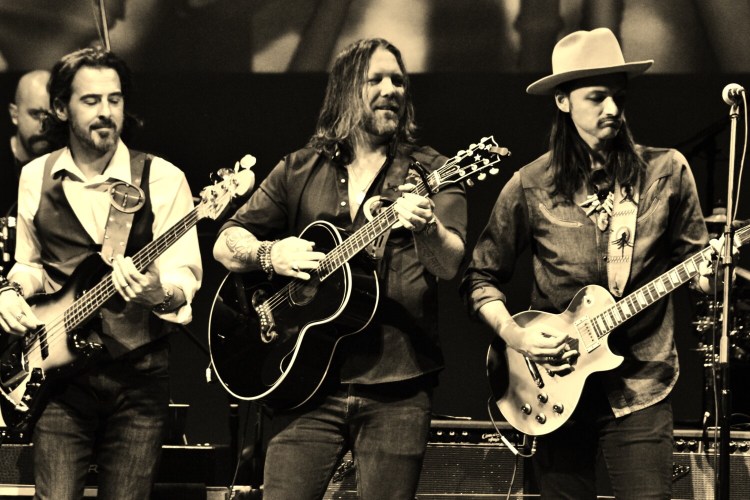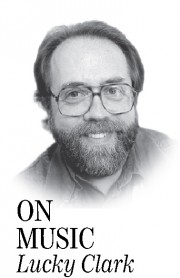When I was teaching, I knew I had been doing it a long time when I started seeing children of the kids I had taught early on in my career. Well, it also applies to today’s column in that, quite a few years back, I had the privilege and pleasure being the only music journalist in Maine to get an interview with Greg Allman when he came to the Cumberland County Civic Center.
Well, flash forward to 2019, and I found that the son of that late, legendary rocker was bringing his new band to Rock Row at the Maine Savings Pavilion on Aug. 11, opening for legendary rocker John Fogerty. I knew I had to chat with Devon Allman about this new project of his and Duane Betts, the son of another Allman Brothers Band member, Dickie Betts. But to do that, I had to call Allman when he and his group were touring Germany, which led to coordinating time zones and cell signals. After a couple of futile attempts, a connection was made and a hasty 11-minute conversation happened.
Q: When I found out you were coming up to Maine with your new band, I had to interview you if at all possible.
Allman: Cool, man. Well, let’s get her kicking while we’ve got a signal.
Q: Well, you’re over there in Germany, so I’ve got to ask: How is your music going over over there?
Allman: It’s going great, man. I’ve been coming to Europe for 15 years, and they’re hungry for just that authentic kind of blues-and-soul inspired, country-inspired American music. They can’t do it with their accents like we can do it, so they import it. They love it. They embrace it, and they’re some of the best fans in the world.
Q: Speaking of fans, have you ever played up in Maine before?
Allman: I have, yeah. I’ve played there several times. It’s one of my favorite states in the nation, actually; it’s gorgeous. I have a definite affinity for Maine. We haven’t played there as Allman Betts Band yet. I believe we played Portland last year when it was The Devon Allman Project with Duane Betts opening, so this will be our first time as our new entity, as it were, and we’re looking forward to it.
Q: Well, having listened to your debut album, “Down to the River,” before doing this interview, I’ve got to say that your fathers would be really proud of what you guys have created here.
Allman: Thank you.
Q: How much of what they did influenced you in what you do as a band?
Allman: You know, when we went to start writing for the record, we did something very important, and I was proud of us for doing it: we spent several evenings over dinner and just hanging out with our third writer, Stoll Vaughn, just talking about the type of record that we were looking to make. Just aesthetically, sonically. We kicked around some records that we really thought kind of embodied the vibe of just what our natural playing lends itself to, anyway.
Q: Like what?
Allman: Some of those records included Derek and the Dominos’ “Layla,” “Sticky Fingers” by the Stones, pretty much anything by The Band. So once you kind of know that that’s the sepia-toned avenue that you’re looking to go down, we’d write songs and we’d know right away whether that was going to fit in the batch. There were a couple that we wrote that we said, “Well, that doesn’t quite go — it’s cool, but … ” We had a framework, and once we spit out the first couple of songs, then the doorway was open and the record already kind of had a bit of an identity. It became pretty apparent what we were going after. So yeah, man, it was a cool process.
Q: The end result was a good blend of rockers and ballads that flowed really well, making for a coherent whole and an entertaining listening experience.
Allman: Thank you. Thank you very much.
Q: I know this album just came out a couple of weeks ago, but are you thinking about the follow-up CD at all?
Allman: Absolutely. I think anyone in this industry knows how this thing works. It’s like playing chess; you’ve got to think a few moves ahead, and that’s just being smart. I mean, you book a whole tour a year in advance, so you’ve got to know the other facet of your existence is making albums. We actually already have Stoll out on tour as our opening act, and we’ve used our time wisely — during the daytime, backstage, on the bus, whatever. And we’ve already written 10 songs for the next album. We hope to write upwards to 30-35 songs and then pick the ones that live together the best. We already have the studio booked for December. We’re going to return to Muscle Shoals; we’re going to return to the loving arms of Matt Ross-Spang, our producer; we’re going to return to two-inch tape. If it’s not broke, don’t fix it. I think sonically it could be, dare I say, kind of a sequel. It’s like, “There is the foundation, so let’s expand on that.”
Q: One thing I’ve observed over the many years I’ve been doing this is how sons can sound like their fathers. Lukas Nelson sounds like Willie, Jordan Zevon sounds like Warren and you sound like your dad …
Allman: (Laughter)
Q: It’s amazing how that’s passed on — genetically, do you think?
Allman: Well, I don’t know. We’re fortunate. We’re fortunate to keep the road going and make people feel good. I mean, at the end of the day, that’s why we all do this. That’s why we make records: to connect with people and bring people together.
Q: Is there anything you’d like to pass on to the folks reading this article?
Allman: Oh, you could send them to the website (allmanbettsband.com), and we look forward to playing Maine, for sure. It’s been a really successful tour, and the show is a lot of fun, high energy and a lot of different bags to pull from, from our new album and my past releases and Duane’s record that came out last year. We do tip the hat with a couple of songs — not too many, not too few, of our dads’ music. And we tip our hats to some of our other musical heroes, as well. It’s just a fun show. People leave, and you can tell that they’ve gotten their money’s worth, and they feel good, and that’s what it’s all about.
Q: Oh, speaking of musical heroes — could you give me a few words, before we close, on the topic of opening for John Fogerty, perchance?
Allman: Yeah! I mean, it’s still pretty mind-blowing. I can’t wait to do those shows. He’s an icon; he’s a true pioneer, and I cannot wait to just simply grab a chair side-stage and watch the master at work. John Fogerty’s one of the most iconic voices of American music in the 20th Century, period. So we feel incredibly honored, to say the least.
Lucky Clark has spent 50 years writing about good music and the people who make it. He can be reached at luckyc@myfairpoint.net if you have any questions, comments or suggestions.
Send questions/comments to the editors.




Success. Please wait for the page to reload. If the page does not reload within 5 seconds, please refresh the page.
Enter your email and password to access comments.
Hi, to comment on stories you must . This profile is in addition to your subscription and website login.
Already have a commenting profile? .
Invalid username/password.
Please check your email to confirm and complete your registration.
Only subscribers are eligible to post comments. Please subscribe or login first for digital access. Here’s why.
Use the form below to reset your password. When you've submitted your account email, we will send an email with a reset code.